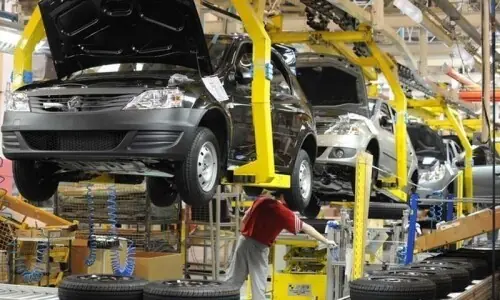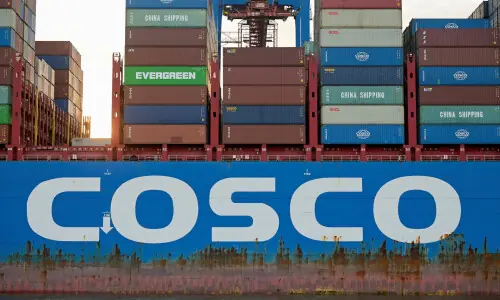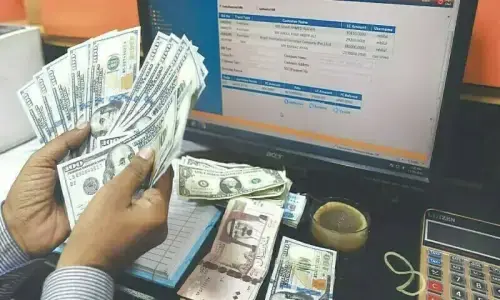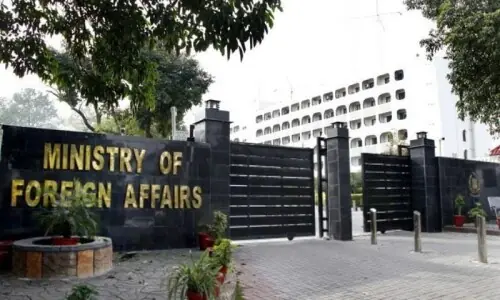Unaddressed for long, numerous imbalances in many market economies, emerging or developed — aggravated by global geopolitics and the war in Ukraine — have turned into grave crises. But a high rate of current, unsubdued, persisting inflation has triggered politically the most sensitive ‘cost-of-living-crisis’ worldwide.
In Pakistan, inflation has become a crucial political issue because of its possible fallout on the coming provincial and national elections preceded by local body polls. And yet there is no clear indication of how the cost-of-living-crisis will be resolved.
The headline inflation is likely to increase temporarily, may remain elevated throughout the next fiscal year and is expected to fall to the targeted 5-7 per cent level by the end of 2023-24, says the State Bank Monetary Policy Statement (MPS) issued on May 23. The headline inflation rose from 12.7 per cent year-on-year in March to 13.4pc in April.
In 2022-23, the economic growth is estimated at half the rate of 7-8pc that the economists usually maintain is required for putting the idle manpower to work and reducing poverty. The central bank expects the economy to grow at 3.5-4.5pc in FY23 on the back of tight monetary policy and stipulated fiscal consolidation, from the estimated 6pc this fiscal year. The World Bank is of the view that Pakistan’s economy cannot grow more than 4pc on a sustainable basis.
During the pandemic, there was a new billionnaire every 30 hours while a million people worldwide fell into extreme poverty every 33 hours, according to Oxfam
Business leaders have criticised the central bank’s policy rate hike by 1.5 basis points to 13.75pc, arguing that it would discourage investment and industrialisation by increasing the cost of doing business.
According to the National Accounts Committee (NAC), the initial estimate of the investment-to-GDP ratio was at 15pc of GDP, the highest during PTI’s tenure but, according to an analyst, the ratio was below the level left behind by the PML-N government in 2018. The private sector investment remained at last year’s level of 10pc of GDP while fixed investment improved slightly to 13.4pc of GDP.
However in a little more than 10 months (July 1, 2021, and May 6, 2022) banks had made fresh net lending to the private sector of about Rs1.296 trillion against Rs421 billion, indicating a growth in the economy. Apart from hiking the policy rate on May 23, the central bank has also enhanced the rates for concessionary working capital for exporters and on loans for purchasing machinery to 7pc and 7.5pc to lessen distortions. This is expected to curb domestic demand as well as inflation.
Despite lower savings and investment than targeted by policymakers, the NAC has projected economic growth of 6pc for this fiscal year. The growth is stated to be consumption-led with domestic demand being met substantially from foreign-debt financed imports. The PML-N government has announced temporary curbs on imports of non-essential items — measures not seen enough by many.
The savings-to-GDP ratio fell steeply to 11.1pc in the current fiscal year from the previous year’s level of 14pc. The ratio is stated to have deteriorated due to the current account deficit.
Initial moves have also been made by the government to encourage export-oriented investment. During his visit to Karachi on May 20, Prime Minister Shehbaz Sharif announced the immediate removal of the 17pc general sales tax on solar panels imposed by the PTI government, arguing that it is the only way forward to reduce the country’s oil imports. He also stressed the need for a compulsory solar geyser policy for every household.
Finance Minister Miftah Ismail recently offered tax incentives to multinational companies if they present him with a plan for exports. So far foreign companies have invested in import substitution industries as they have long maintained they need incentives for their products to be competitive in the export market. Foreign direct investment fell 1.6pc to $1.45bn in 10months of the current fiscal year. The inflow in April was $170.6 million, almost unchanged from a year ago.
Prime Minister Sharif also expects an investment of $1bn by Saudi Arabia for the installation of a desalination plant in Karachi to meet the growing water shortage in the city. He is confident that the plant would take off soon as the investment guarantee has to be used within 2022. Saudi Arabia wants it to be the biggest desalination plant in the region.
But challenges are enormous. Pakistan is among the 12 countries which are deemed more exposed to the ongoing war in Ukraine than others, says the United Nations Economic and Social Commission for Asia and the Pacific (UNESCAP).
In its latest policy brief on “The War in Ukraine-Impacts, Exposure and Policy Issues in Asia and Pacific”, UNESCAP reports that these 12 countries could be hit hardest because they were exposed to higher energy and food prices, smaller external financial inflows, rising financial costs, and a sudden shift in business sentiments. (Pakistan may have to spend $1.5bn on wheat imports to offset supply disruptions caused by the Ukraine war. Wheat output is estimated at 26.9m tonnes this season, less than the target of $28.9 tonnes.)
The UNESCAP says surging global energy and food prices are pushing up consumer inflation which will disproportionately hurt poor households. At the same time, rising interest rates and surging inflation are impairing household balance sheets, investors’ confidence and the government’s ability to service debt.
People have become familiar with the idea of a cost-of-living-crisis but that does not begin to capture the gravity of what may lie ahead, wrote an analyst in The Economist recently. The war in Ukraine is battering a global food system weakened by Covid-19, climate change and energy shock.
Ukraine’s export of grains and oilseeds have mostly stopped, Russia’s hampered and India has suspended wheat exports. A BBC report says that the high cost of staple foods has already raised the number of people who can not be sure of getting enough to eat by 440m, to 1.6bn. Nearly 250m are on the brink of famine.
The charity Oxfam which issues a report on inequality during the Davos forum every year claims that over the last two years a new billionaire had been created every 30 hours. On the other end of the income spectrum, Oxfam expects around 1m people to fall into extreme poverty every 33 hours this year, according to BBC’s television channel quoting the charity’s international executive director Gabriela Butcher.
Published in Dawn, The Business and Finance Weekly, May 30th, 2022

































